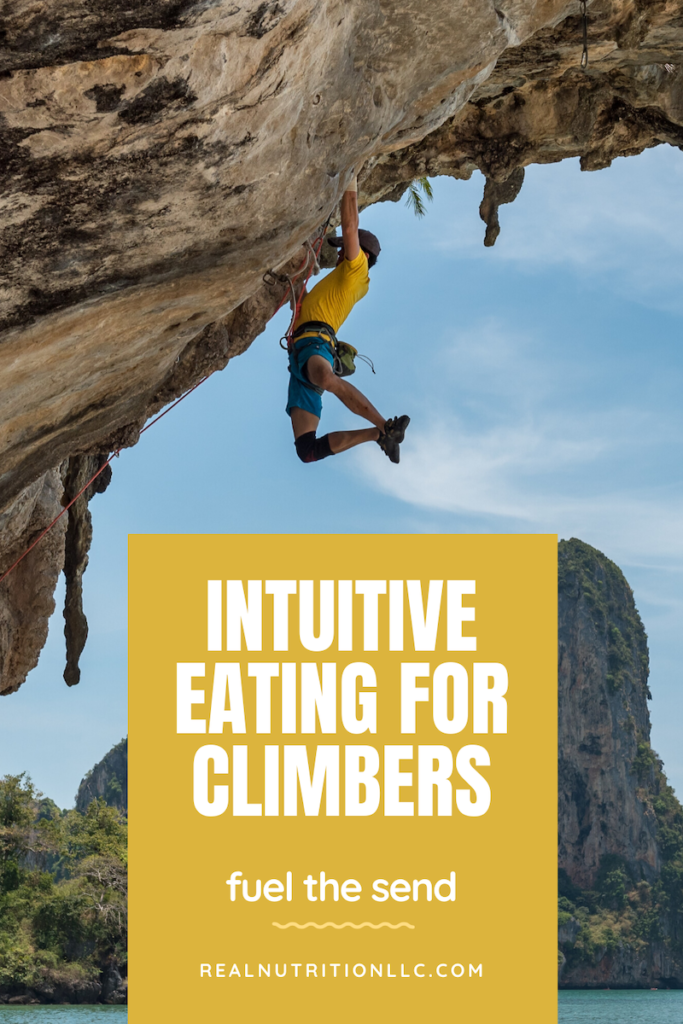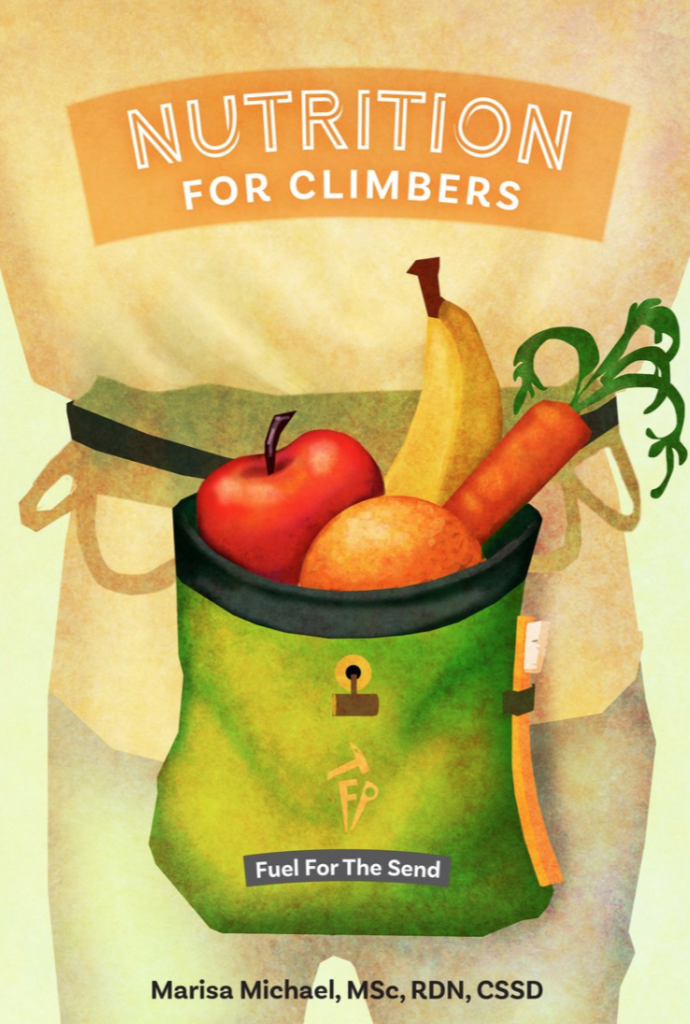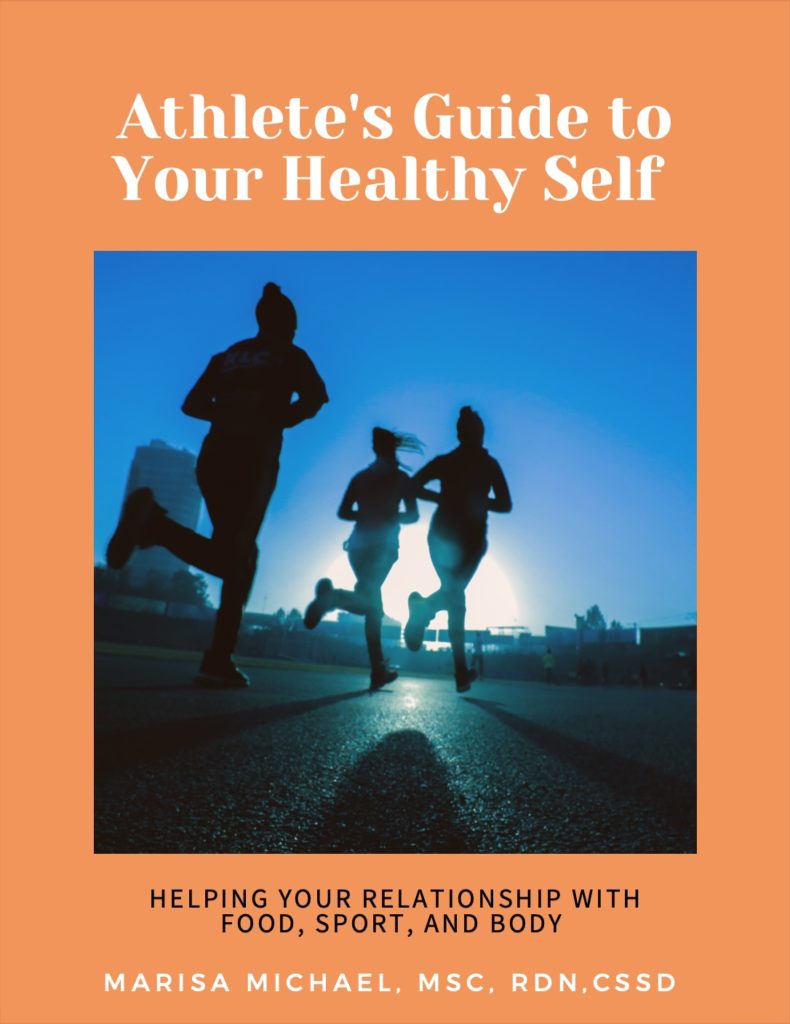
How should rock climbers eat?
Intuitively. Most of the time.
When it comes to proper nutrition, athletes often toe the line between athletic excellence and disordered eating. In climbing, there’s pressure to cut weight in order to optimize strength-to-weight ratio. But if you ditch hunger cues, this could lead to mental and physical health problems.
According to one unpublished study by Dr. Lanae Joubert, 6% of male and 17% of female climbers exhibit disordered eating habits. The more elite the climber, the more likely they are to exhibit some form of disordered eating. Forty three percent of elite female climbers reported having disordered eating habits compared to 20% of advanced female climbers.
What is disordered eating?
Disordered eating is a range of behaviors where eating food isn’t a natural response to hunger. Disordered eating habits are driven by external cues (such as portion size, time of day, and diet rules), rather than internal cues (such as hunger, fullness, energy levels). Emotions often play a role. If climbers adopt rigid guidelines of what, when and how much to eat, it can lead to disordered eating.
Some examples include:
- Eating meals at a certain time
- Restricting calories
- Obsessions with meals and food
- Avoiding certain foods
- Labeling food as “good” or “bad”
- Manipulating diet and exercise to lose weight
- Guilt or shame during or after eating
Health consequences of low energy availability
In theory, the less you weigh, the less gravity opposes your weight, thus making it easier to climb. Climbers may go down a dangerous path that can lead to disordered eating behaviors if they are hyper-focused on weight.
To lose weight you have to create an energy deficiency, which means you take in less calories than your body uses. Sustained energy deficiencies can lead to a condition called Relative Energy Deficiency in Sport (RED-S) or low energy availability. RED-S can lead to dangerous health consequences.
Calorie deficiencies impact climbing in the following ways:
- Reduced endurance due to glycogen depletion
- Increase risk of fractures because of decreased bone density
- Increased risk for osteopenia or osteoporosis
- Increased risk of injury
- Loss of lean muscle mass
- Loss of period for female climbers (can impact bone health and fertility)
- Mood disturbances
- Loss of mental sharpness
With chronic underfueling, a climber’s strength may decline and ultimately do more harm than good. Proper nutrition is key, and poor nutrition can be a barrier to long term progress in the sport. Adequate calories are required to help your muscles perform to their max and to preserve your health.
How proper fueling helps climbers
- Muscle glycogen stores are full. This means you are able to produce energy for working muscles.
- When glycogen stores are empty, you can replenish them to fuel more climbing.
- Mental strength is maintained because your brain is fueled (the brain needs glucose too).
- Lean muscle mass is conserved because protein isn’t used as fuel.
How can intuitive eating help climbers?
Climbing is a physically demanding sport. Our bodies are naturally programmed to maintain balance. When we impose restrictions by dieting, excluding or controlling we set the stage for war with food instead of food bringing joy and sustenance.
Intuitive eating is about being at peace with food and removing the control it may have over you. It allows for you to have a healthy relationship with food, one that promotes long term health and physical strength. It will help you tap into your body’s internal needs to ensure it has the protein, carbohydrate, water, fat and the overall calories required to perform the demands of the sport. Intuitive eating is about honoring the evolution of your physiology, being attuned to your body’s needs, and allowing that to guide your food choices.
Simple tips to start eating intuitively:
- Let your body tell you what it needs and honor that. This means rejecting any preconceived notion of what you think is best, and trusting your body more. Eat when you are hungry. Honor the hunger.
- Experiment with foods during training sessions to see which ones make you feel the most energized and satiated without bloating or discomfort.
- Pre-fuel with long lasting carbohydrates before you head out to feed your cells and give yourself a strong start to the day.
- Plan ahead. Pack fluids, carbohydrate and protein rich snacks that will provide energy when you feel depleted while you are out. This will ensure you have what you need to replenish glycogen stores, promote muscle growth and have the energy to keep climbing.
When intuitive eating may not work
Intuitive eating is a great framework for people if they are in tune to their body’s cue–hunger, fullness, satiety, and mental and emotional cues. It’s really difficult if you’re not in tune to cues or don’t understand how to notice and honor them.
Cues can be disrupted for a number of reasons–chronic dieting, disordered eating, medical conditions, medications, endurance exercise or heavy training, etc. If you are trying to rely on hunger cues to tell you when to eat, but your hunger cues are faint or missing, you may end up under-eating.
Finding help and support from a qualified dietitian and therapist can help you become attuned to your body’s cues. It takes time and practice, but most people get the hang of it. You may also need a dietitian to understand how much to eat in the absence of hunger due to heavy training.
Our bodies are smart. If you can be attuned to it’s cues, it can help you fuel right. The idea is simple, if the body is hungry, feed it. Climbers who aren’t used to that will have to plan ahead to ensure they pack the fuel they need for the day. Chronic dieters or those that have gone through eating disorders may be out of touch with their body’s cues. It will take time, planning and conscious effort to move away from disordered eating habits. Adopting a mindset that aims for athletic excellence over disordered eating will ensure you are taking in adequate calories and avoiding calorie deficiencies so you can climb stronger, longer.
Want more information? Check out our on-demand intuitive eating course!

This article was written by Kaila Dickey and Marisa Michael
For more help and support with one-on-one consultations, book an appointment at realnutritionllc.com.
For more reading, visit intuitiveeating.org
Listen to Marisa Michael being interviewed on the TrainingBeta podcast
Blog post: Mary Cain, Nike, and RED-S
Blog post: Should you lose weight to be faster?
Blog post: Lose weight to send? The dark side of climbing and eating disorders
Book: Nutrition for Climbers: Fuel for the Send


~This is general information only and not nutrition advice. Always consult your healthcare provider before undergoing any dietary or lifestyle change.
